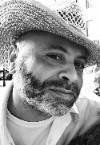Faculty and Visiting Faculty
ROBERT LOPEZ

Associate Professor, Creative Writing
Robert Lopez is the author of three novels, Part of the World, Kamby Bolongo Mean River —named one of 25 important books of the decade by HTML Giant, All Back Full, and two story collections, Asunder and Good People. A new novel-in-stories, A Better Class Of People, will be published by Dzanc Books in March, 2022. Dispatches from Puerto Nowhere, his first nonfiction book, will be published by Two Dollar Radio in September, 2022.
His fiction, nonfiction, and poetry has appeared in dozens of publications, including
Bomb, The Threepenny Review, Vice Magazine, New England Review, The Sun, and the Norton
Anthology of Sudden Fiction – Latino. He lives in Brooklyn, New York.
FACULTY INTERVIEW:
What genre(s) do you write in?
Fiction and creative nonfiction, for our purposes in the MFA program. Outside, I have also written for the screen, television and film.
What is the thing that excites you about the act of writing?
Coming up with one good sentence or one good line. Something fresh and new. That's what feels exciting, both as a writer and as a reader.
Do you feel like your work is in conversation with other writers or work? If so,
who/what?
The work is in conversation with a host of writers and artists that have moved me to sit down and put language together. That would include Samuel Beckett, David Markson, a whole lot of dead people. But also, friends like Peter Markus, Kim Chinquee, and Sam Ligon. I hope to be in conversation with many writers, all who pay attention to language and use form in interesting ways.
What literary magazine would you recommend to your students?
Certainly the traditional reviews like The Iowa Review, The Three-Penny Review, Black Warrior Review, New England Review, and Conjunctions. There also are, of course, a host of online venues that are quite good as well. My advice is to find the collections of stories and poems that you enjoy, flip to the acknowledgements page and see where those pieces have appeared. Then, you know where you want your work to be. That's how you get into the conversation.
What is your writing process?
I start with words that seem to go together in an interesting way. I start with a sentence that might provoke a second sentence, and I keep writing sentences until I see what I might have. From there, I read it over and over and over again to make sure that by the end it is a crafted piece. With the novels I have written, I always start each day's work by reading from the beginning until I get to where I left off. I'm making notes along the way: what should recur, what should be negated, what should be contradicted. It’s a matter of paying attention to what you've done.
How do you generate ideas?
I've never written from an idea. I wouldn't know how, for the most part. The work comes organically from language, and then, from that initial spasm of language, comes the human mess that's been on my brain for all these years.
How do you manage when you get stuck?
There are plenty of times where I don't write and don't try to write. I don't write every day. I can go months without writing. Those periods always feel somehow restorative. Eventually, language starts to build up and wants to come out and I get back to it. There are writers and writing teachers who will advocate that you've got to write every day and I just don't see how that's helpful. I only want to write when it feels like I should.
Inspiration or perspiration?
I think you need both. I need to feel some urgency to want to do the work. But at the same time, it's not always going to come flowing through me from the ether. Once the urgency presents itself, and the practice is engaged, that's where the hard work comes in.
If you weren't a writer, what job would you have?
Crime. Probably a mob boss.
Do you have a writing tip for emerging writers?
Read. Read deeply, read broadly, and re-read. As a writer or artist, doing the work is critical, and I would say maybe 80% of that, particularly as prospective MFA students, current MFA students and in the post-MFA years, is making sure that you are reading like a writer. Reading for work that you could steal, for work that moves you, for writers you want to be in conversation with. Reading what people wrote 100 years ago, 500 years ago, and certainly reading your contemporaries.
